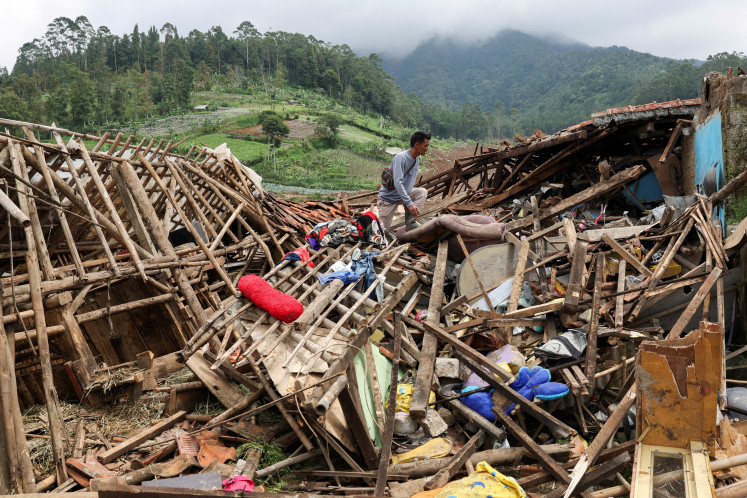Popular Reads
Top Results
Can't find what you're looking for?
View all search resultsPopular Reads
Top Results
Can't find what you're looking for?
View all search resultsSE Asia C. banks agree to cooperate on hot money
The central banks of five major Southeast Asian countries agreed during a meeting here Friday to cooperate on how to better manage the inflow of funds into the region
Change text size
Gift Premium Articles
to Anyone
T
he central banks of five major Southeast Asian countries agreed during a meeting here Friday
to cooperate on how to better manage the inflow of funds into the region.
Speaking to reporters following the meeting, Bank Indonesia deputy governor Halim Alamsyah said Indonesia, Malaysia, Singapore, Thailand and the Philippines agreed to further discuss the issue at higher level meetings in February to achieve a concrete agreement as capital inflows were regional concerns.
Deputy governors of the South East Asia Central Banks (SEACEN) member countries discussed cross border issues on Friday and would seek for the governors’ approval to seal the agreement,
he added.
“We announced our intentions today at the deputy governors’ meeting. This forum will report to the [SEACEN] board of governors. If they agree, an agreement will be signed,” Halim said on the sidelines of the SEACEN meeting.
He did not disclose the details of the expected agreement, but said it would focus on multilateral or
bilateral agreements on cross border micro and macro financial supervision to strengthen regional cooperation to manage capital inflows.
“There will be joint supervision,” he said.
Halim added that the agreement would require central banks to disclose their monetary and financial stances. “But we need to sign a secrecy agreement in the first place, and that’s why there will be a discussion on it.”
Muliaman Hadad, another deputy governor of Indonesia’s central bank, said Indonesia already had bilateral cross border agreements with Singapore, China, Malaysia and the Philippines, and was currently seeking one with Australia and India.
A.G. Karunasena, the executive director of the SEACEN Centre, said the region had learned from the 1997/1998 Asian financial crisis, that micro-prudential supervision alone was insufficient and had to be coupled with macro-prudential surveillance and early warning systems.
Halim explained that Southeast Asian countries worked together when massive capital outflows
hit the region several years ago, resulting in the Chiang Mai initiative.
“Now we have to discuss our cooperation in the midst of the ongoing capital inflows. Who knows if
it turns into a Bali initiative,” Halim said.
The Chiang Mai Initiative is a multilateral currency swap agreement among the 10 members of the Association of Southeast Asian Nations (ASEAN) plus three other nations, which are China, Japan and South Korea. The ASEAN plus three are also members of the SEACEN.
Faster economic growth compared with that of the developed nations has attracted foreign investors to invest their funds in the emerging markets, including the Southeast Asian countries.
China, which is a member of SEACEN, has been among the main subjects of the so-called “currency war”, in which it refuses to let the yuan appreciate despite pressure from other countries especially the United States. (est)










